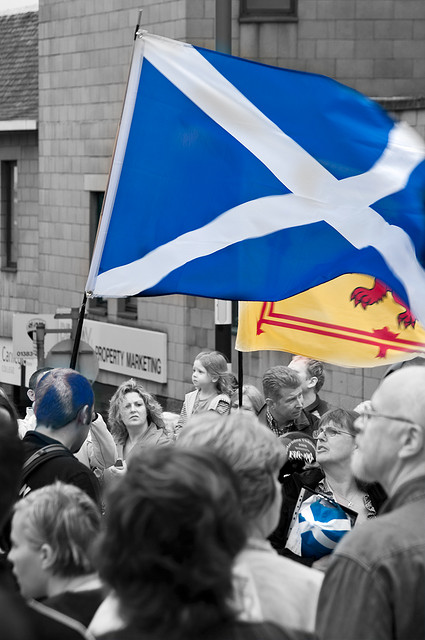The land marked by the poet Robert Burns, the economist Adam Smith, and the reign of Mary Queen of Scots readies itself for a momentous referendum this Thursday. Some five million Scottish voters will decide: “Should Scotland be an independent country?”
The voting age has been lowered to 16; about 97 per cent of the population have registered to vote; a turnout as high as 90 per cent has been predicted; and aggregated polling suggests a close result. At least one in 10 voters is undecided.
The campaign features a classic confrontation. The Yes side expounds its hope that self-government will improve the lot of most Scots. The No camp asks voters to think about what may be lost if Scotland leaves the United Kingdom.
The Yes campaign has depicted Scotland as disenfranchised. The Scottish national parliament is subordinate to the U.K. parliament in Westminster, where Scots are a small minority. With full powers for its own parliament, Holyrood, in Edinburgh, Scots will be able to govern themselves by majority rule.
The Yes side is driven by its critique of the Westminster first-past-the-post electoral system (Holyrood has proportional representation). An unrepresentative U.K. parliament giving “Crown-in-Parliament” powers to a prime ministerial government with no Scottish representation makes an easy target for those discomforted by distant elites deciding for Scotland.
The Yes campaign builds on historic attempts dating back over a century to attain Scottish home rule, or devolution of powers within the U.K. unitary state. Following a 1997 successful referendum, Holyrood sat for the first time in 1999. Prior to the 1707 Act of Union that joined the Scottish and English crowns, a Scottish parliament (Three Estates) had existed since the 13th century.
The Scottish parliament is funded by a block grant from Westminster. With privatization, cuts to services, and the attack on the welfare state, real U.K. public spending (after inflation) has been going down, and therefore the amount of money transferred to Scotland keeps going down in the same proportion.
The Yes campaign contends that to keep Scottish priorities such as no university tuition, Scotland must be able to control its own revenues.
The Yes campaign argues that Scottish oil resources have been squandered by the U.K. government, and in the future could better be managed for the prosperity of Scotland by Holyrood.
The Scottish National Party (SNP) grew into a force able to form a majority government at Holyrood as the oil revenues expanded, and the share going to Scotland was deemed insufficient by many Scots. The Scottish Green Party joins the SNP in favouring independence. The “watermelons” (green on the outside, red on the inside) provide a sharp critique of corporate domination of U.K. politics.
The No campaign is counting on Scotland being a conservative country, and expecting significant numbers to be loath to take a risk for an uncertain gain. Appeal is not to the British flag and U.K. glory, but to the Scottish bank account, pension and cost of living.
The week previous to the vote has featured an orchestrated campaign by Scottish banks and U.K. businesses to underline the costs of independence. The banks announced they would move their head office registration (not operations) to the U.K. The big supermarket chains maintained Scottish food prices would go up after a Yes vote. Financial interests pointed to falling stock prices and endangered future pension plan payouts.
The Yes campaign proposal for a currency union with the U.K. was denounced continuously. Economics dominated press coverage of the referendum.
Propaganda directed behind the scenes from the Prime Minister’s offices in London aside, public debate and discussion has been intelligent, informed, and drawn wide attention from Scots. The intensity of public interest and attention has forced the uneasy No alliance of Conservatives, Labour, and Liberal Democrats to say that if Scotland stays, the U.K. will have to change.
In an editorial, “Britain Deserves Another Chance,” the London-based Guardian argues social justice can be achieved in the U.K. However, further devolvement of powers to Scotland, Northern Ireland and Wales opens up the hairy question of England not having its own parliament, and the doubtful appeal of adopting a federal structure for the U.K.
The Guardian editorial suggests the referendum campaign had revealed “vibrant civic society really can shape our shared life.” It misleadingly argues nationalism is a poor vehicle for social justice, when the Yes campaign has been built on democratic demands rather than national attachment.
Scottish national identity is not in question; continued interest in the like of Burns and Smith attest to its resilience. As in 1542 (and after) when the six-day-old child Mary inherited its throne, what is at stake is the ability of Scotland to control its future.
Duncan Cameron is the president of rabble.ca and writes a weekly column on politics and current affairs. He is in Scotland to cover the referendum debate for rabble.ca.
Photo: Ross G. Strachan/flickr




